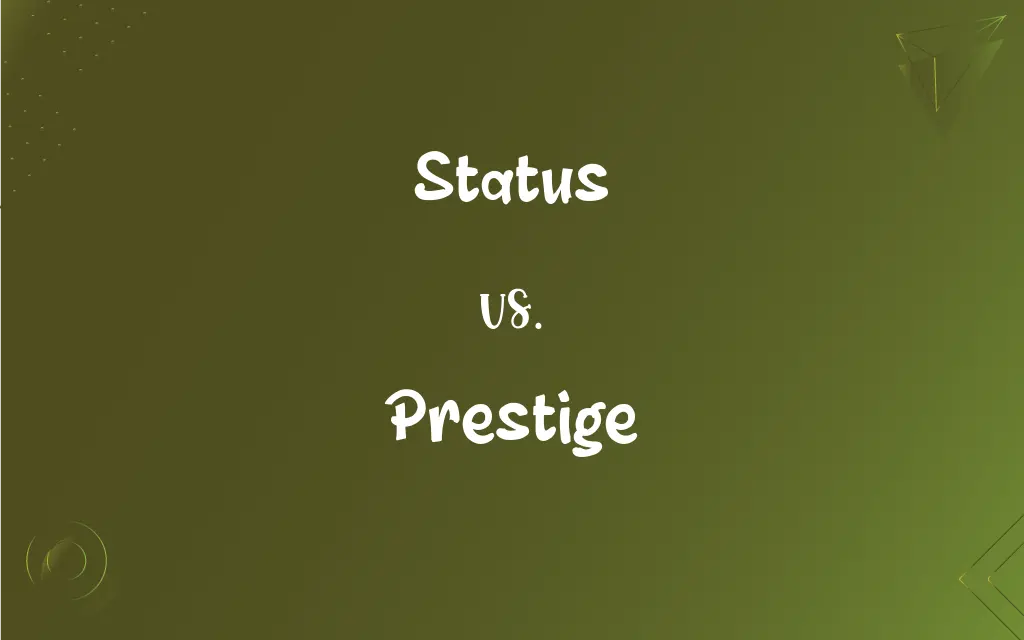Status vs. Prestige: What's the Difference?
Edited by Harlon Moss || By Janet White || Updated on October 12, 2023
"Status" refers to one's position or rank in relation to others, while "Prestige" is the admiration and respect earned by one's achievements or association.

Key Differences
Status generally denotes the relative position or standing of someone or something in a societal, professional, or other structured environment. Prestige, on the other hand, relates more to the admiration, respect, and high regard that a person or entity holds in the eyes of the public or peers.
One can possess status due to birthright, job position, or other social determinants. For instance, a CEO has a higher corporate status than a manager. In contrast, prestige is often earned. A Nobel Prize-winning scientist gains prestige from their recognized contributions to their field.
Status can be more quantifiable. It might be defined by explicit levels, ranks, or hierarchies, such as in military ranks or corporate structures. Prestige, however, is more subjective, often based on public perception, esteem, and recognition.
Importantly, status does not always command respect or admiration. A person might inherit a title or be in a high position but not necessarily be admired for it. Prestige, by nature, always involves a degree of admiration and positive regard.
Both status and prestige play crucial roles in societal dynamics. While status might dictate one's role or position, prestige can influence how they are treated or viewed by their peers and society at large.
ADVERTISEMENT
Comparison Chart
Definition
Position or rank in a system
Admiration earned by achievements or association
Acquisition
Through position, birthright, or assignment
Often earned through notable achievements
Measurement
Often quantifiable (e.g., ranks)
Subjective; based on public perception
Associated Feelings
Might not always involve respect or admiration
Inherently involves admiration and respect
Dependency
Can be independent of public opinion
Largely depends on public perception
ADVERTISEMENT
Status and Prestige Definitions
Status
Legal standing or condition
Her status as a citizen grants her certain rights.
Prestige
High reputation earned by achievements
The university has prestige due to its renowned faculty.
Status
A social or professional standing
The status of doctors in society is generally high.
Prestige
Widespread admiration or respect
The brand's prestige attracts many loyal customers.
Status
Position relative to others
His status in the company improved after the promotion.
Prestige
Recognition for outstanding quality
The car model is known for both its performance and prestige.
Status
Relative rank in a hierarchy
His military status was that of a lieutenant.
Prestige
Elevated status due to positive regard
His multiple awards added to his prestige in the industry.
Status
Position relative to that of others; standing
Her status is that of a guest.
Prestige
Sign of distinction and excellence
The award is a mark of the highest prestige in literature.
Status
High standing; prestige
A position of status in the community.
Prestige
The level of respect at which a person or thing is regarded by others; standing
An act that boosted his prestige.
A job with low prestige.
Status
(Law) The legal character or condition of a person or thing
The status of a minor.
Prestige
Good reputation; honor
Her accomplishments lent a lot of prestige to the college.
Status
The state of affairs; the situation
What is the status of the negotiations?.
Prestige
Great respect or importance
Doctors are usually treated with prestige.
Status
A person’s condition, position or standing relative to that of others.
Superstition is highly correlated with economic status.
Prestige
The quality of how good the reputation of something or someone is, how favourably something or someone is regarded.
Oxford has a university of very high prestige.
Status
Or high standing.
Prestige
Delusion; illusion; trick.
Status
A situation or state of affairs.
What's the status of the investigation?
New York is known for its status as a financial center.
Prestige
Regarded as relatively prestigious; often, considered the standard language or language variety, or a part of such a variety.
Status
(legal) The legal condition of a person or thing.
Prestige
(video games) To start over at an earlier point in a video game with some type of bonus or reward.
Status
The state (of a Canadian First Nations person) of being registered under the Indian Act.
He is a status Indian.
Prestige
Delusion; illusion; trick.
The sophisms of infidelity, and the prestiges of imposture.
Status
(social networking) A function of some instant messaging applications, whereby a user may post a message that appears automatically to other users, if they attempt to make contact.
I'm just about to update my status to "busy".
Prestige
Weight or influence derived from past success; expectation of future achievements founded on those already accomplished; force or charm derived from acknowledged character or reputation.
Status
(medicine) Short for status asthmaticus.}}
Prestige
A high standing achieved through success or influence or wealth etc.;
He wanted to achieve power and prestige
Status
State; condition; position of affairs.
Status
The relative position or standing of things or especially persons in a society;
He had the status of a minor
The novel attained the status of a classic
Atheists do not enjoy a favorable position in American life
Status
A state at a particular time;
A condition (or state) of disrepair
The current status of the arms negotiations
Status
A situation at a particular point in time
The project's status is currently in progress.
FAQs
Is "Status" the same as "Prestige"?
No. "Status" refers to one's rank or position, while "Prestige" relates to admiration and respect earned.
Can an object, like a car, have prestige?
Yes. Brands or objects can carry prestige due to quality, rarity, or societal value.
Is "Prestige" always earned through personal achievements?
Not always. "Prestige" can also derive from family lineage, association, or other external factors.
How is "Prestige" commonly measured?
It's often subjective, based on public perception, reputation, and the respect an entity commands.
Is "Prestige" always positive?
Typically, yes. It denotes a positive regard and admiration.
Are there any negative implications to having high prestige?
High prestige often comes with expectations and pressures to maintain that reputation.
How is "Status" commonly indicated?
Through titles, ranks, societal roles, or even material indicators like wealth.
Can organizations have a status?
Yes. For instance, universities can have a particular status based on rankings.
Can one have high status without prestige?
Yes. Someone might have a high position (status) without being particularly respected or admired (prestige).
Is status permanent?
Not necessarily. Status can change with life circumstances, job roles, societal changes, etc.
Can status be inherited?
Yes, status can be inherited, as seen in royal or notable families.
Can prestige be lost?
Yes. Actions, scandals, or societal shifts can diminish one's prestige.
Do all societies value prestige the same way?
No, what's prestigious in one culture might differ in another due to societal norms and values.
Can a person's "Status" influence their "Prestige"?
It can. High-status positions might come with a level of inherent prestige, though not always.
Does higher education always lead to greater prestige?
Not always. While education can enhance prestige, other factors like character, achievements, and actions also play a role.
Can prestige be bought?
While money can buy indicators of prestige (luxury items, for instance), genuine respect and admiration are typically earned.
Can a person elevate their status?
Yes, through achievements, acquiring positions, or other societal advancements.
Can objects have status?
Yes. Certain brands or items can indicate a status due to their value or rarity.
Is it beneficial to have a status without prestige?
It depends. While status can offer privileges, without prestige, the respect or admiration from peers might be lacking.
Are "Status" and "Prestige" universally important?
While both concepts exist in most societies, their importance varies based on cultural and societal values.
About Author
Written by
Janet WhiteJanet White has been an esteemed writer and blogger for Difference Wiki. Holding a Master's degree in Science and Medical Journalism from the prestigious Boston University, she has consistently demonstrated her expertise and passion for her field. When she's not immersed in her work, Janet relishes her time exercising, delving into a good book, and cherishing moments with friends and family.
Edited by
Harlon MossHarlon is a seasoned quality moderator and accomplished content writer for Difference Wiki. An alumnus of the prestigious University of California, he earned his degree in Computer Science. Leveraging his academic background, Harlon brings a meticulous and informed perspective to his work, ensuring content accuracy and excellence.































































